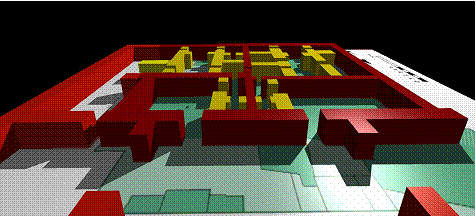The sensation reminded us of the one evoked by a virtual reality walk through on a computer screen – except that in this case the "virtual" reality was "real," at least in the sense that it was physically defined by actual steps taken on the ground. It remained "virtual" in many other respects, first of all as a result of the lack of a roof, hence with lighting conditions totally different from those that obtained in the "real" setting.
It is however a fact that such a virtual walk-through, especially if it is accompanied, as is the case at Mozan, by a careful signage that brings points to detail of circulation patterns and of wall construction.
A film clip offers a visual overview of such a walk through, complemented by a parallel "virtual" walk through on the computer screen.

